The Best Sunscreen for Dark Skin Tones
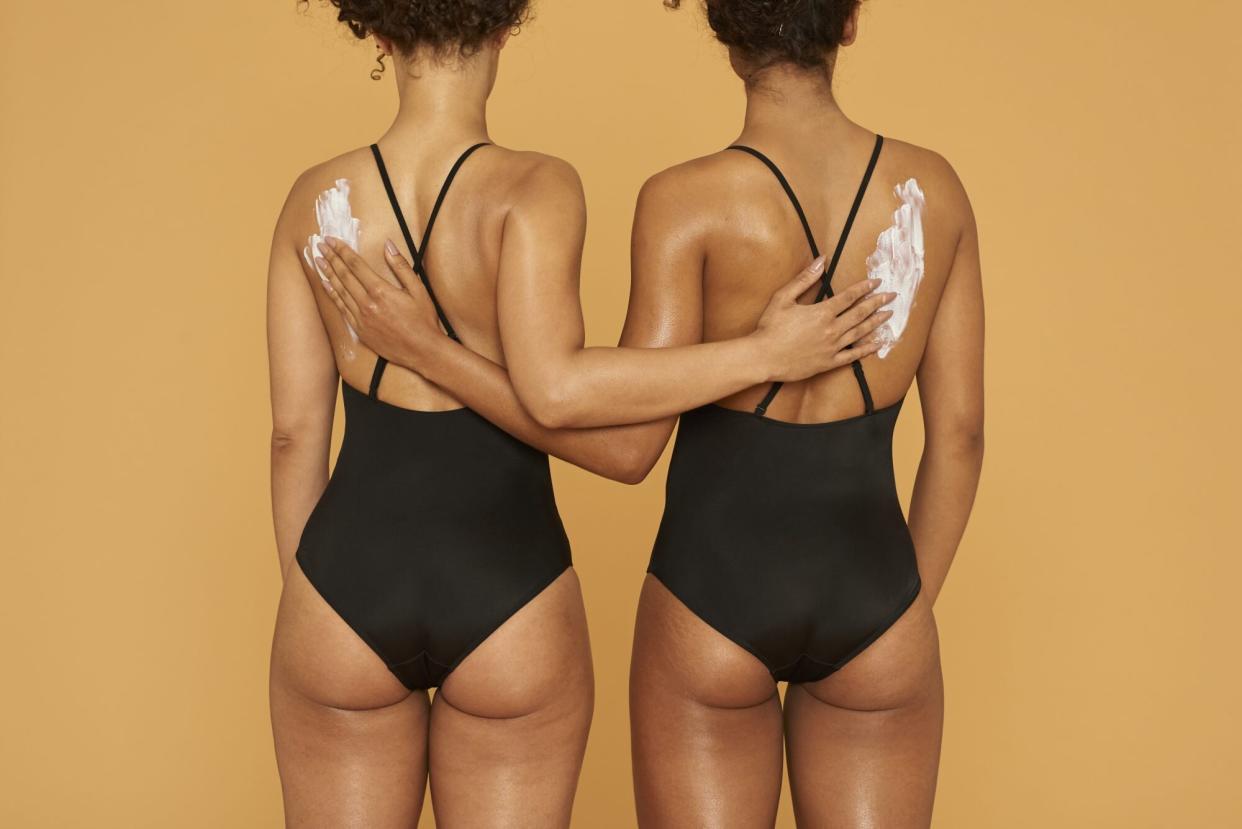
Getty Images
Confession: I can probably count the number of times I've used sunscreen as an adult on one hand. I could do without the awful smell, the stickiness, the possibility of it causing a breakout, and the godforsaken ashy cast that it leaves behind on my dark skin. While my mother made sure to keep a bottle of sunscreen in her bathroom cabinet, I hardly remember using sun protection as my cousins and I played in the hot, Florida sun, summer after summer. Still, it wasn't until I was out of college, on a vacation in the Bahamas that I first remember experiencing sun damage. After a sunny beach day, I saw that my forehead was flaking and automatically thought I had dandruff until a friend — who was lighter than me, but still Black — informed me that I was sunburned.
I believed a common misconception surrounding dark skin and sun damage: I thought that having dark skin provided unyielding protection against the sun's harmful rays. To some degree, that's true. Black people are the least likely to get sunburned while white people have the highest rates of sunburn, according to a study performed by the Centers for Disease Control and Prevention (CDC). Why? "Melanin in darker skin types has a photo-protective role and provides a natural protection factor," says Karen Chinonso Kagha, M.D. F.A.A.D., dermatologist and Harvard-trained cosmetic and laser fellow. "People with darker skin naturally have a higher amount of sun protection at baseline due to the [amount of] melanin." However, that natural protection never exceeds SPF 13, according to this Winchester Hospital article.
While my melanin magic can provide some natural protection against sun damage, I (and everyone else, regardless of their complexion) stand to benefit from sunscreen.
Misunderstandings About Sun Damage and Dark Skin
"I think that the myth 'Black don't crack' in our community is harmful and really does our skin a disservice," says Caroline Robinson, M.D., F.A.A.D., dermatologist founder and CEO of Tone Dermatology. "Wearing sunscreen is one of the single most important investments we can make in our skin health. External skin insults like UV rays, visible light, and air pollutants are harmful to the skin irrespective of the color. While it is true that melanin provides some protection and that those with melanin-rich skin tend to age slower, the effects of chronic sun exposure in the form of discoloration, wrinkles, and even skin cancers are all possible on the skin [of people] of color." (Related: The 10 Best Hydrating Skin-Care Products for Melanated Skin)
And although sun damage and skin cancer are less prevalent in the Black community than in the white population, skin cancer can result in more dangerous consequences for darker skin tones when it does occur, says Dr. Kagha. In fact, Black patients are more than three times as likely to be diagnosed with melanoma at a late stage than non-Hispanic white patients, according to the Skin Cancer Foundation. In fact, 52 percent of non-Hispanic Black patients receive an initial diagnosis of advanced-stage melanoma, versus 16 percent of non-Hispanic white patients. They also have a lower survival rate when compared to their white counterparts, according to a study published in the journal Medicine.
So, what accounts for this gap? "First, there's a lower public awareness overall of the risk of skin cancer among individuals of color," wrote Andrew Alexis, M.D., M.P.H., chair of the department of dermatology at Mount Sinai St. Luke's and Mount Sinai West in New York City, in this article on the Skin Cancer Foundation website. "Second, from the perspective of health-care providers, there's often a lower index of suspicion for skin cancer in patients of color, because the chances of it actually are smaller. So these patients may be less likely to get regular, full-body skin exams."
Dermatologist Angela Kyei, M.D., agrees, echoing "moles in dark-skinned people don't get checked as often because of the misconception that dark-skinned people don't get skin cancer," when speaking to the Cleveland Clinic. It's also important to note that people with deeper skin tones also tend to get skin cancer in different locations than people with lighter skin. "For example, in African Americans and Asians, we see it more often on their nails, hands, and feet," Dr. Kyei continued. "Caucasians tend to get it more in sun-exposed areas." (Related: These Skin Treatments Are *Finally* Available for Darker Skin Tones)
Why Everyone Should Be Wearing Sunscreen
Since skin cancer can affect Black skin, adequate sunscreen application is also key, no matter your skin tone. "The average adult needs more sunscreen than we typically apply to cover the entire skin surface," says Dr. Kagha. "I like to apply the product twice over to help eliminate any skipped areas. It's also important to remember that sunscreen does not replace physical sun protection such as tightly woven clothing, big hats, cover-ups, large sunglasses, etc."
You should always use a sunscreen that offers broad-spectrum protection (which protects against UVA ad UVB rays), has an SPF rating of 30 or higher, and is water-resistant, according to the American Academy of Dermatology Association (AAD) recommendations. All of these factors work together to prevent sunburn, early skin aging, and skin cancer. The AAD advises applying sunscreen about 15 minutes before going outdoors and reapplying approximately every two hours or after swimming or sweating.
And if you still aren't sold on the importance of sunscreen for Black people, another benefit of wearing SPF might sway you. Hyperpigmentation, a condition in which patches of skin become darker in color, is a common skin concern, and Black patients are particularly at risk just by virtue of having more melanin, says Dr. Robinson. Specifically, post-inflammatory hyperpigmentation (PIH) often caused by acne, bug bites, or inflammatory conditions such as eczema is one of the most common skin problems patients of color experience, she adds. "Because light stimulates pigment production, the very first step in any treatment to address hyperpigmentation is always sunscreen."
How to Find the Best Sunscreens for Dark Skin
As a child of the nineties, I remember most sunscreen and sun protection products being traditionally advertised and geared toward non-Black people — even the ingredients weren't selected with POC in mind. After slathering on an old-school sunscreen, I often found that I was left with a white, ashy residue on my skin.
That's often still the case with many of today's formulas. "Mineral sunscreens are notorious for leaving a white cast or purple-gray hue on the skin after application and this is a top reason why my patients discontinue use," says Dr. Robinson. "This is typically the result of a physical screen ingredient called zinc oxide which is very difficult to blend into darker skin tones." (Mineral or physical sunscreens contain zinc oxide and/or titanium dioxide and deflect the sun's rays whereas chemical sunscreens contain oxybenzone, avobenzone, octisalate, octocrylene, homosalate, and/or octinoxate and absorb the sun's rays, according to the American Academy of Dermatology.)
"While I prefer mineral sunscreens for my patients with more sensitive skin and those who are very acne-prone, chemical sunscreens are safe to use and more importantly do not have the same risk for developing a cast," says Dr. Robinson. "It's important to try a few different sunscreens until you find one that you like and the one that you'll wear." (Related: The Best Spray Sunscreens That Won't Dry Out Your Skin)
That means if you have skin that's dark in color and acne-prone, you may have to be even more selective in order to find a formula that doesn't leave a white cast but also doesn't tend to make you break out. "I typically recommend that patients who are acne-prone opt for oil-free sunscreens and avoid ingredients like vitamin E, shea butter, cocoa butter in their sunscreens," advises Dr. Robinson. "Additionally, certain ingredients in chemical sunscreens such as avobenzone and oxybenzone can make existing acne worse. Beyond this, I think the choice is personal. How the sunscreen feels on your skin — how light or heavy it is, whether it's a cream or a lotion — these are personal preferences that do not affect your sun protection." (Related: The 11 Best Sunscreens for Your Face, According to Customer Reviews)
Finding sunscreen for dark skin that didn't give you a chalky, white cast used to be near impossible. But thanks to the new wave of diversity and inclusivity in the beauty industry, you can find sunscreen queens that offer sun protection without imparting any ghostly residue.
Best Sunscreens for Dark Skin
Black Girl Sunscreen
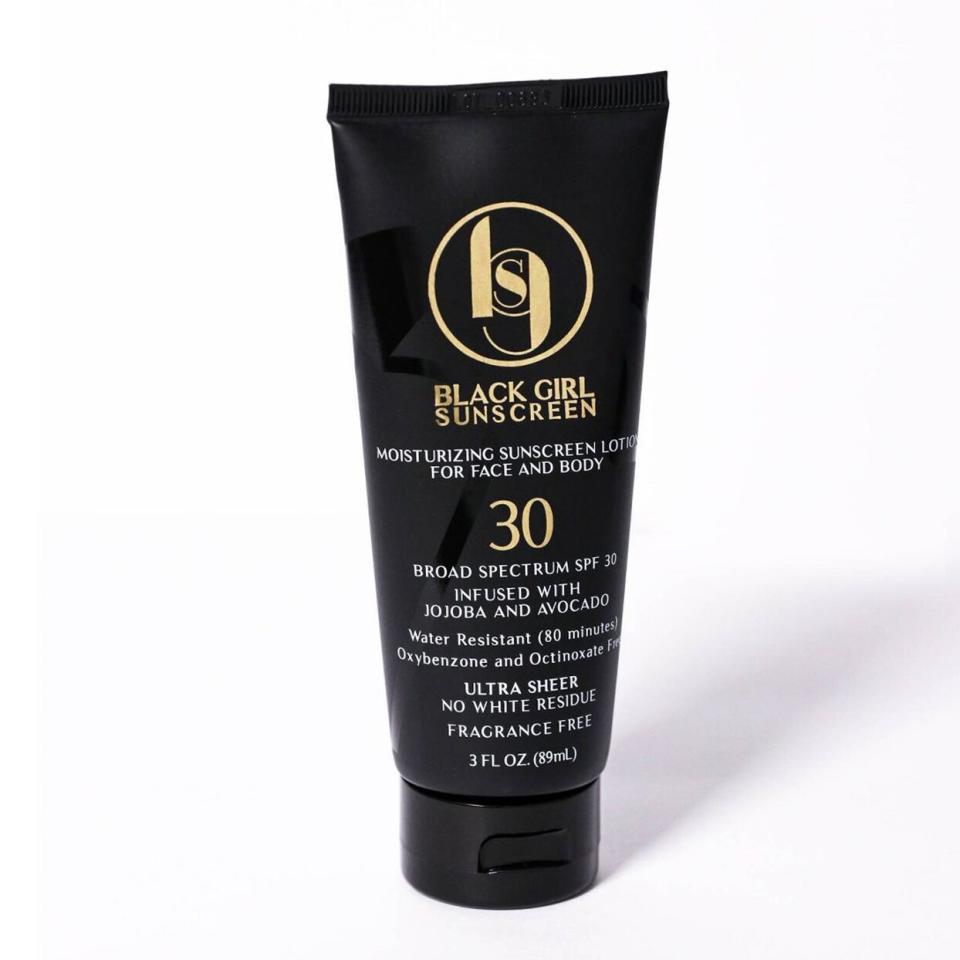
No list of sunscreens for darker skin would be complete without mention of fan-favorite Black Girl Sunscreen. Created by a Black woman for people of color, Black Girl Sunscreen was founded with a goal to spread awareness about sun protection. Its weightless, melanin-protecting Black Girl SPF 30 Sunscreen promises not to leave skin with a sticky residue or white cast. The chemical sunscreen is infused with natural ingredients (including avocado, jojoba, carrot seed, and sunflower oils) that soothe, moisturize, and protect your skin, leaving you with a smooth, consistent skin tone.
Buy It: Black Girl Sunscreen, $16, target.com
EltaMD UV Clear Broad-Spectrum SPF 46
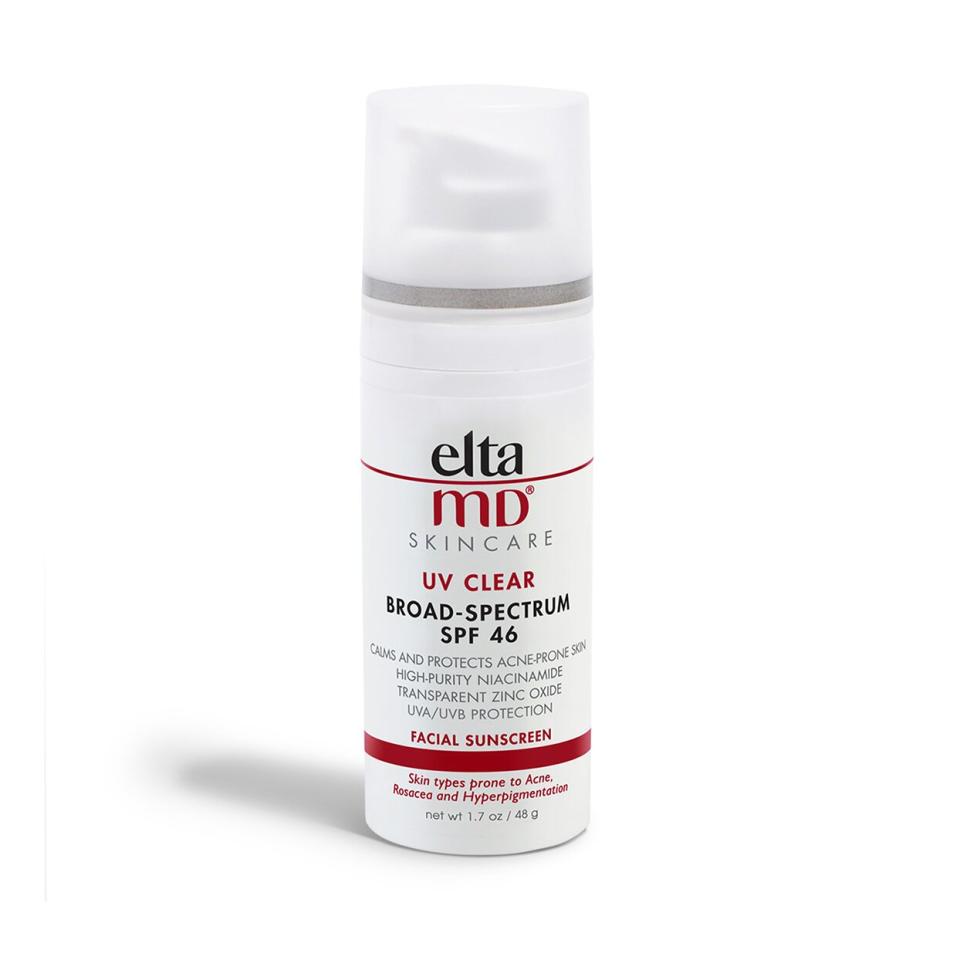
If you have sensitive skin and are seeking a suitable sunblock for dark skin, this EltaMD pick is the way to go. It has 4.7 stars from more than 16,000 ratings on Amazon, and its many fans attest that the word "clear" in its name is accurate, even though it contains both mineral and chemical filters. EltaMD UV Clear Broad-Spectrum SPF 46 is a facial sunscreen that's packed with skin-plumping hyaluronic acid, wrinkle-reducing niacinamide, and moisturizing and exfoliating lactic acid. This oil-free formula is also fragrance-free and non-comedogenic (which means it's less likely to block your pores), according to the brand.
Buy It: EltaMD UV Clear Broad-Spectrum SPF 46, $36, dermstore.com
Eleven By Venus On-The-Defense Sunscreen SPF 30
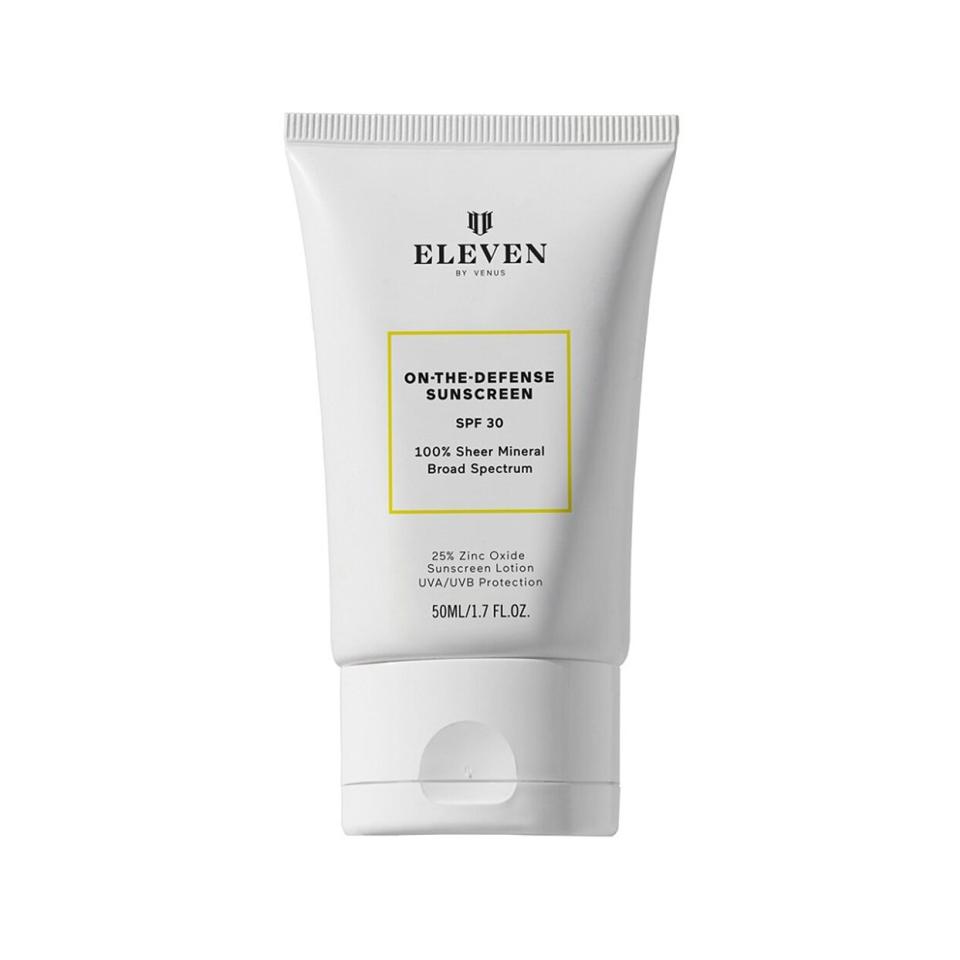
Ulta
Even though mineral sunscreens are more likely than chemical sunscreens to leave a cast, Dr. Robinson still recommends Eleven By Venus On-The-Defense Sunscreen as one of the few mineral options that leave little to no residue. Created by tennis champ Venus Williams, this vegan and cruelty-free formula promises to basically melt into your skin, leaving behind a non-chalky finish. With a 25 percent zinc oxide formula, this sunscreen forms a shield on the skin to provide protection from the sun's damaging rays.
Buy It: Eleven By Venus On-The-Defense Sunscreen SPF 30, $42, ulta.com
Fenty Skin Hydra Vizor Invisible Moisturizer Broad Spectrum SPF 30 Sunscreen
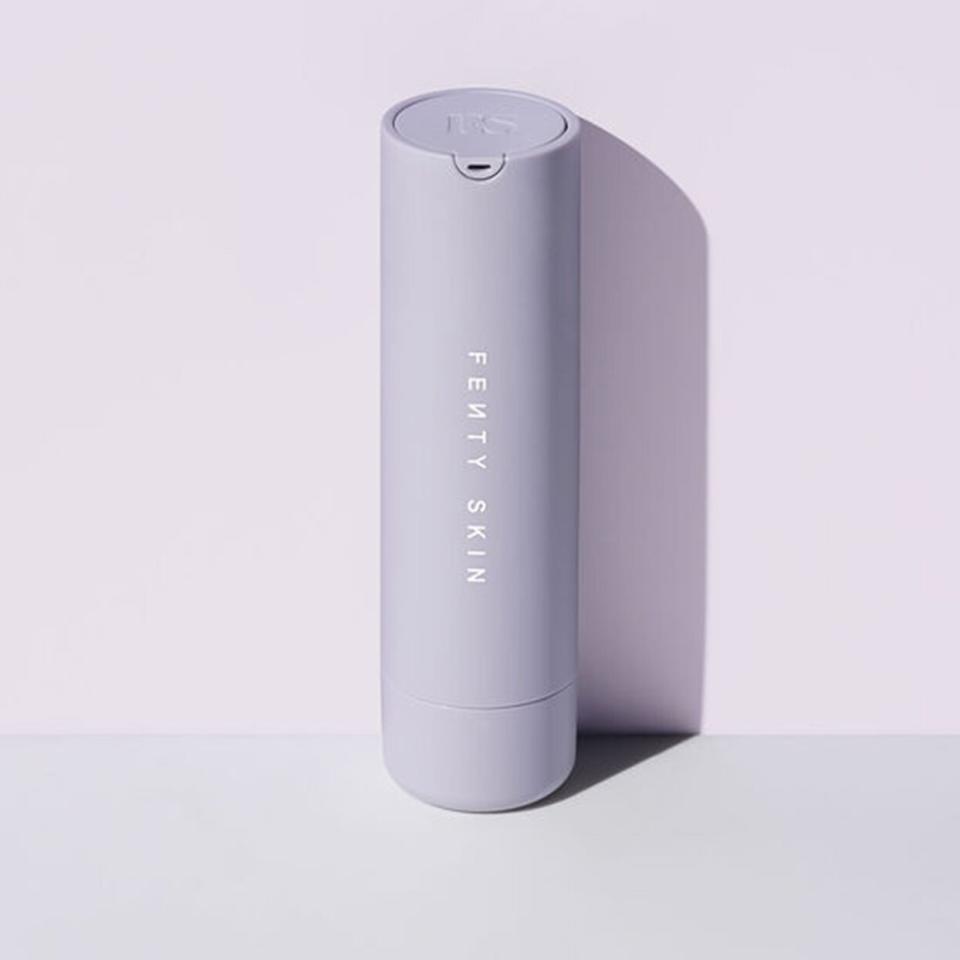
Fenty Skin
If nothing or no one can persuade you to wear sunscreen, perhaps Rihanna will. A believer in the importance of sun protection, Riri included this moisturizer with SPF in her debut skin-care launch. (She later made her thoughts on sun protection crystal clear when responding to an Instagram comment.) The moisturizer and sunscreen duo is lightweight and oil-free, so it won't feel thick and heavy on your skin, and it incorporates chemical blockers avobenzone, homosalate, and octisalate. With superstar ingredients such as hyaluronic acid and niacinamide, it'll help you shine bright like a diamond!
Buy It: Fenty Skin Hydra Vizor Invisible Moisturizer Broad Spectrum SPF 30 Sunscreen, $35, fentybeauty.com
Murad Essential-C Day Moisture Sunscreen
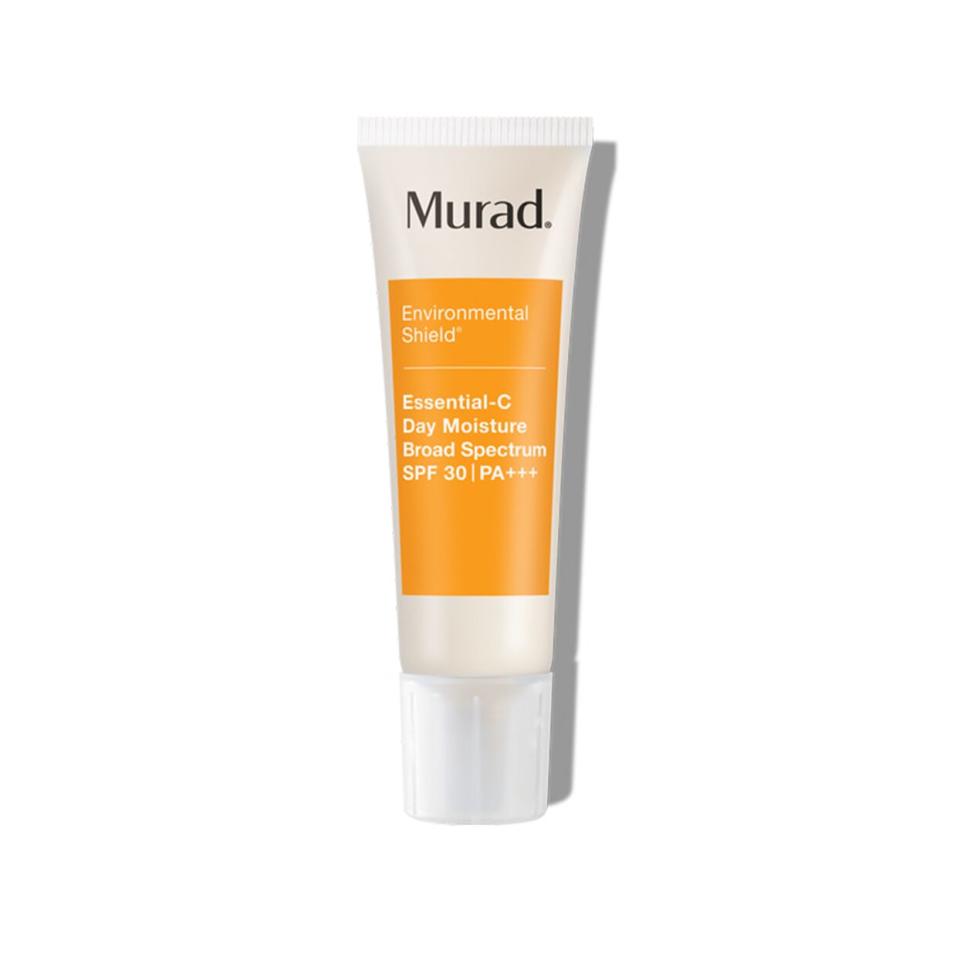
With a 5-star rating on Dermstore, this antioxidant-packed facial moisturizer with SPF 30 seeks to hydrate skin, reduce free-radical damage, and provide broad-spectrum protection (meaning it protects from both UVA and UVB rays). The best part? This formula includes vitamin C, an antioxidant that works overtime to brighten your skin and fade hyperpigmentation. Since it's a chemical sunscreen, rest assured that Murad Essential-C Day Moisture Sunscreen sinks into skin effortlessly.
Buy It: Murad Essential-C Day Moisture Sunscreen, $65, murad.com
Bolden SPF 30 Brightening Moisturizer
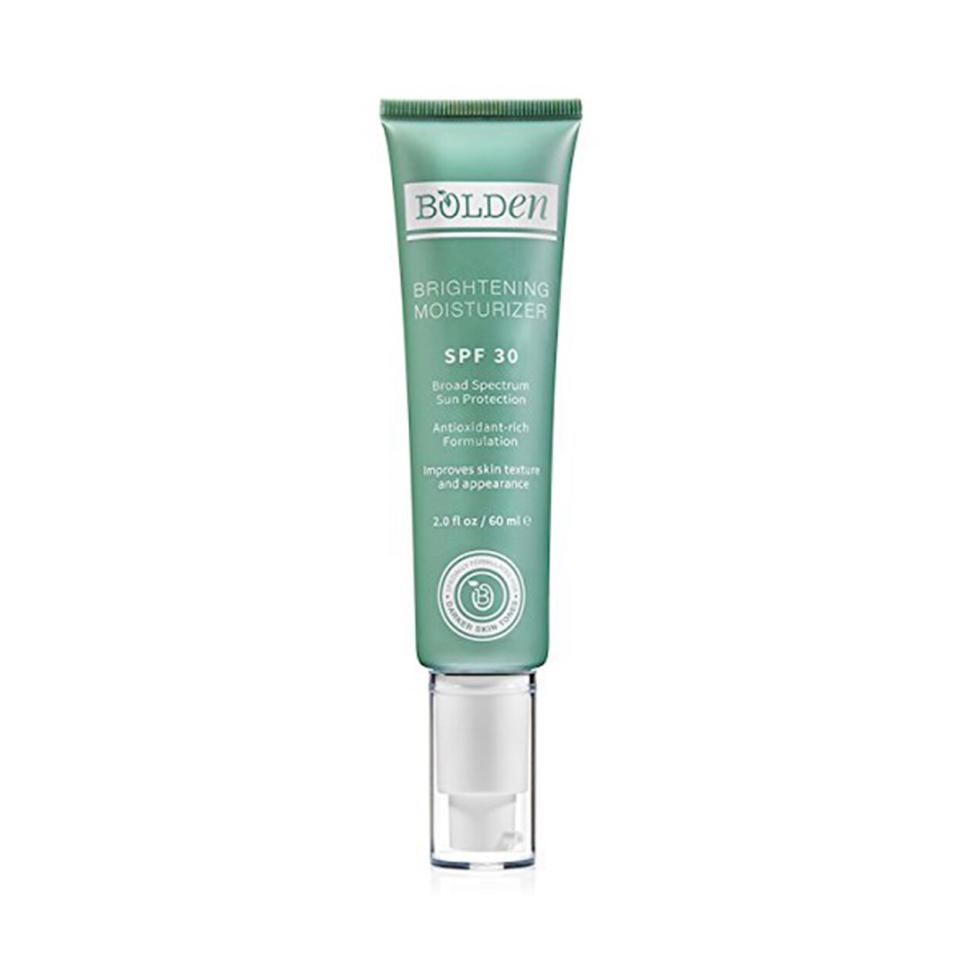
Amazon
Bolden is a Black-owned brand that originally launched with this SPF 30 moisturizer in 2017. The combination product includes both a moisturizer and sunscreen combo and using top-notch ingredients (such as the almighty vitamin C and skin-softening squalane) with chemical blockers to improve the look and feel of skin. Plus, safflower oil keeps skin moisturized.
Buy It: Bolden SPF 30 Brightening Moisturizer, $28, amazon.com
Supergoop Unseen Sunscreen SPF 40
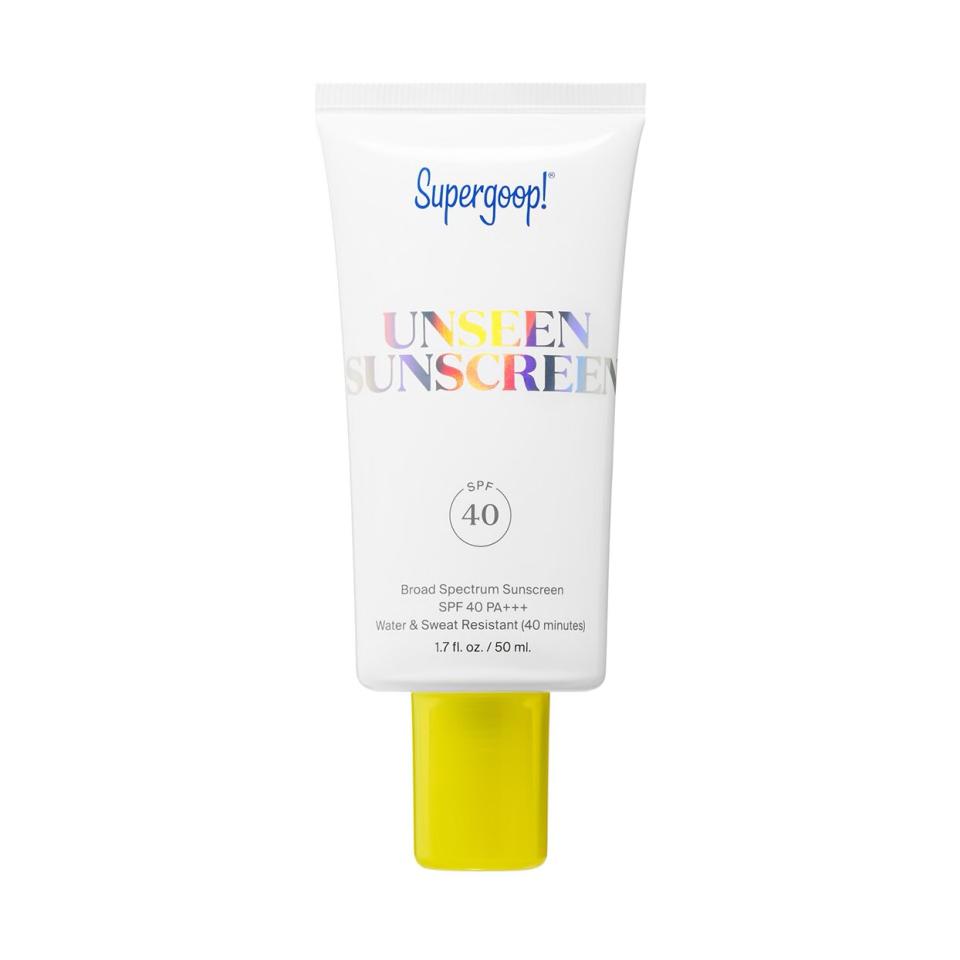
Sephora
The name says it all. This oil-free, broad-spectrum sunscreen is made for anyone who wants an invisible sunscreen. The colorless, oil-free, and lightweight (not to mention antioxidant-rich) formula dries down to a velvety finish. You can wear this multi-tasking chemical sunscreen on no-makeup days, but it's also meant to double as a makeup primer as well.
Buy It: Supergoop Unseen Sunscreen SPF 40, $34, sephora.com
Mele Dew the Most Sheer Moisturizer SPF 30 Broad Spectrum Sunscreen
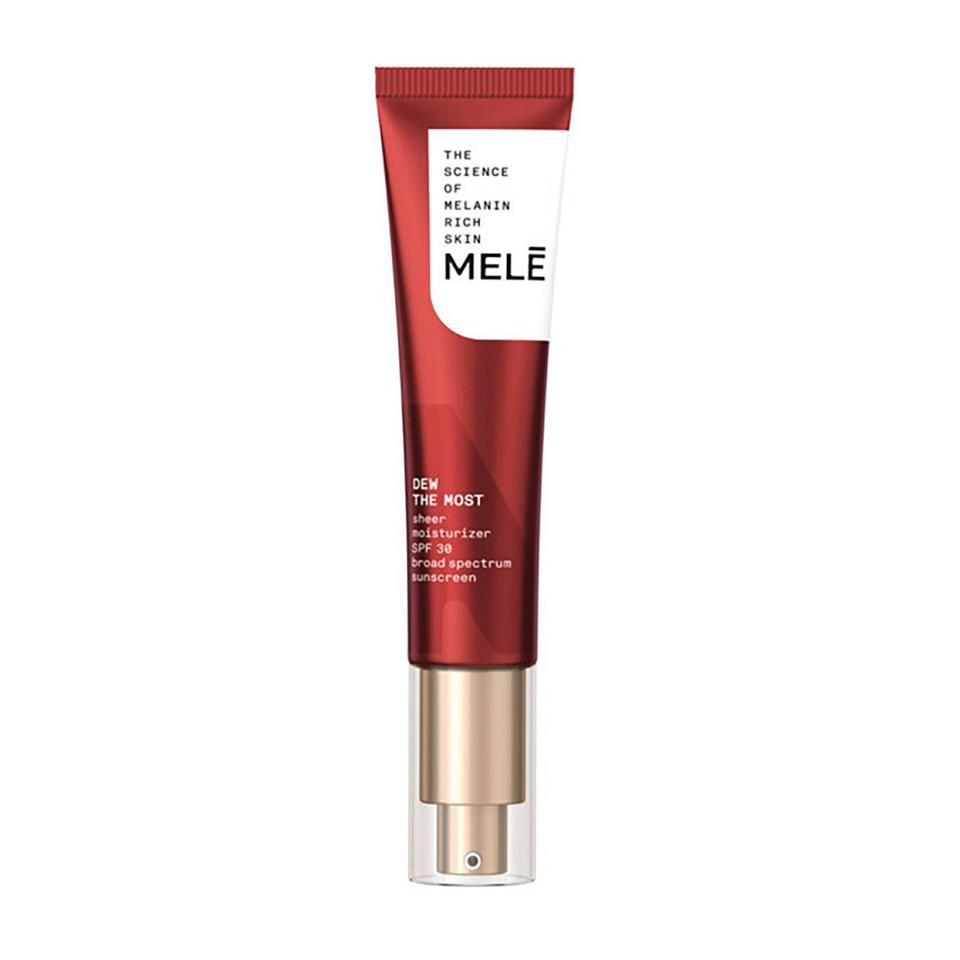
Not only does this moisturizer contain chemical filters that can help prevent hyperpigmentation, but it also contains 3 percent niacinamide to fade existing dark spots. What's more, it's infused with vitamin E, which can reduce the formation of damaging free radicals that can form when the skin is exposed to the sun. Formulated without alcohol or mineral oil, this transparent cream absorbs quickly and blends without a trace. Founded out of a need for more skin-care specific to people of color, Mele worked with dermatologists of color to create a sunscreen that meets the needs of melanin-enriched skin.
Buy It: Mele Dew The Most Sheer Moisturizer SPF 30 Broad Spectrum Sunscreen, $19, target.com

